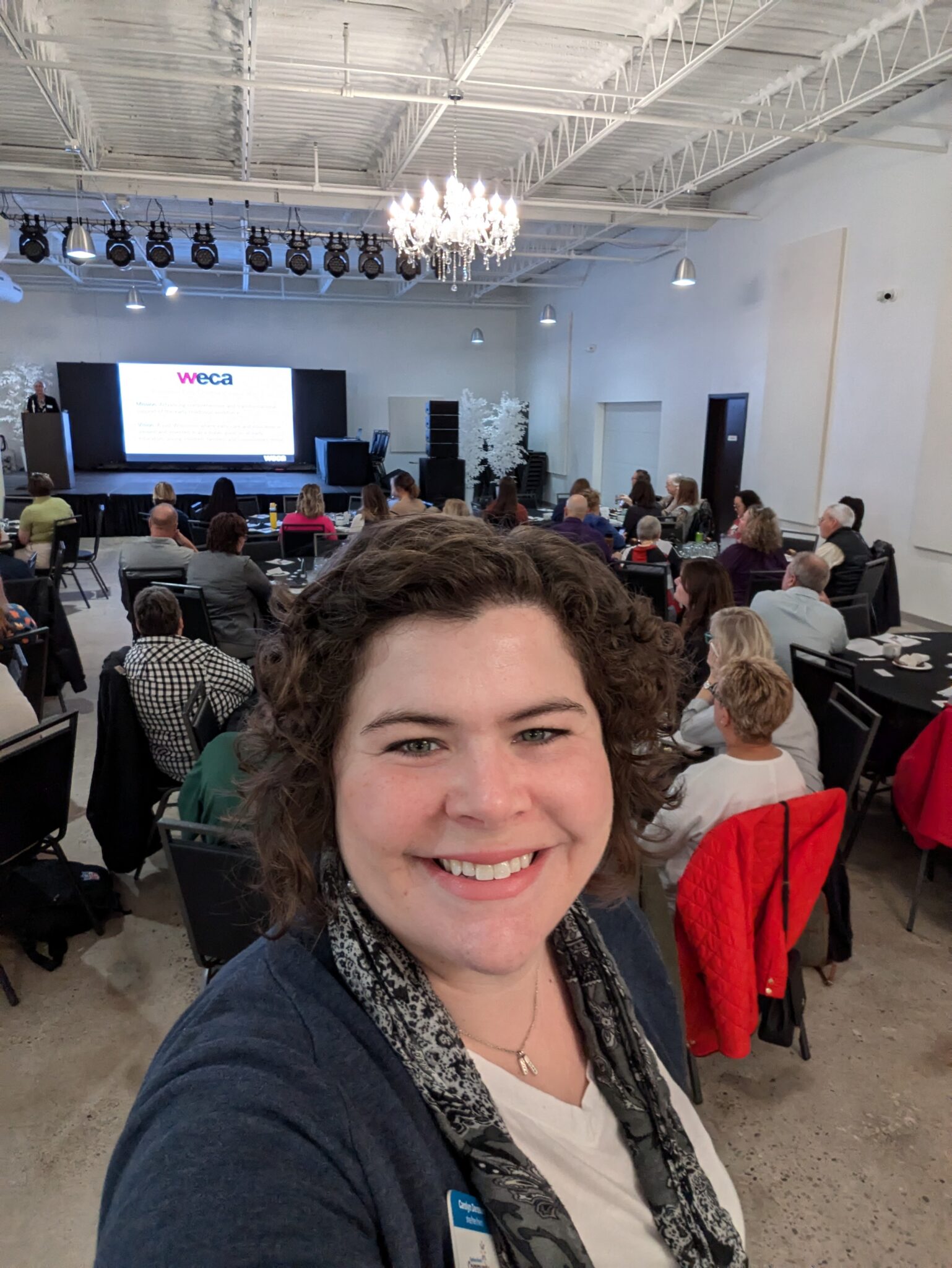From Door County to Appleton: Dual Convenings Address Wisconsin’s Childcare Crisis

Carolyn Desrosiers, Director of Community Engagement
By Carolyn Desrosiers, Director of Community Engagement
Tuesday, October 29 was an uncharacteristically balmy day in Wisconsin, but a good one for driving. I started my day off attending a childcare summit in Door County and ended it with a community childcare forum back in Appleton. The stories, data, and conversations I heard throughout the day highlighted the complexity and urgency of the childcare crisis in our state, but also revealed bright spots of innovative thinking and cross-sector collaboration.
Over 100 people attended the Door County summit, sponsored by United Way of Door County, The Women’s Fund of Door County, and the Door County Economic Development Corporation. Featured speakers addressed school readiness and the critical brain development that occurs from birth to five, the lack of childcare access and affordability, and how these issues impact everyone from children and families, employers and school districts, to local government and more.

Ruth Schmidt of WECA in Door County
Ruth Schmidt, Executive Director of the Wisconsin Early Childhood Association (WECA), also drove across the state to speak at both the Door County and Appleton events. In Door County, she talked plainly about the dire state of Wisconsin’s childcare landscape, citing a recent report from the Department of Children and Families which documented 33,055 unfilled childcare slots in Wisconsin due to childcare staffing shortages caused by low wages and lack of benefits.
At the same time, the cost of care is a burden for most young families. According to a report by Forward Analytics, childcare for two kids costs more than the average rent or mortgage, and even more than the cost of sending two young adults to the University of Wisconsin-Madison, yet there’s no financial aid for childcare.
One serious result of the shortage and high cost of care is fewer adults in the workforce, demonstrated by the alarming statistic Schmidt shared that Wisconsin’s women’s labor force participation rate has dropped below 60% for the first time since the 1980s.
Schmidt explained that since 2020, federal Child Care Counts funding, which came from the CARES Act passed down to the state, has been propping up the childcare system. Child Care Counts helped providers maintain or increase wages and was set to end in January 2024 until Governor Evers directed $170 million in emergency funding to continue the program through June 2025. Sadly, even with this additional funding, the NEW North region has seen a 32% overall decline in total regulated childcare programs from 2013-2024, with reductions as high as 50% in Menominee County and 63% in Shawano County.

Door County Municipal Panel
So, what are communities doing about this issue? Door County created the Door County Child Care Benefit Pilot Program, which engaged employers in providing stipends of up to $300 per month directly to families to help reduce the burden of the cost of care. In the Waupaca area, the Waupaca County and the City of Waupaca have collaborated on mini-grants directly to childcare providers, research to better understand what Waupaca County providers need, developing a shared waitlist system, and creating a Child Care Community Fund.
Fast forward 80 miles and a couple of hours later to the Child Care Forum in Appleton, hosted by the Women’s Fund for the Fox Valley Region and WECA, the voices of local providers and parents were front and center, with local elected officials and candidates invited to listen.

Joyful Beginnings Appleton
Tiffany Simon and Virginia Maus shared the story of their daycare closing in Nov. 2022 and their courageous decision to buy the building and re-open the daycare as Joyful Beginnings Academy so they and other families could continue to have care. (We shared this story in an episode of our Voices from the Valley podcast last year.) They continue to work their other full-time jobs, and to this day do not take a salary for running the center. They were unequivocal in their support for continuing the Child Care Counts program, stating that 51% of providers are likely to close if Child Care Counts ends.
Personal sacrifice was a theme that continued into other stories shared by attendees at the event. One working mother shared that her child’s group center classroom was in danger of closing, so she and other working moms are taking turns volunteering in their child’s classroom one day a week. A grandmother said that she retired early, leaving a high-profile career, to care for her grandchildren.
Tara Ebben, owner of the family childcare Tikes and Tots which serves 8 children and is one of only three licensed childcare programs in Shiocton, puts in 60+ hours per week with her program only open Monday through Thursday. She said that she has one child on her waitlist who has not been born yet and will not be able to join until Fall 2026. Ebben supports state investment in quality childcare.
Some people balk at the idea of public investment in childcare; however, one thought-provoking question that was raised in both childcare convenings was, what changes when a child turns four years old and suddenly the state invests $7,000 per child? Or when they turn six years old, and the state invests $16,909 per child? We seem to value public investment in K-12 education as a societal benefit, so why don’t we view public investment in young children, who are at a critical stage of brain development, the same way? To all Wisconsinites reading this, next time you’re on a long drive around our beautiful state, I challenge you to noodle on this very question.



Leave a Comment